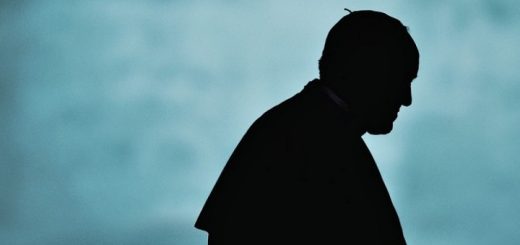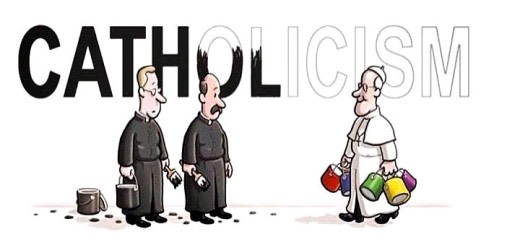Uphill roads. The many paths of the LGBT Christians and their parents in the Catholic Church
Article by Daniele Morini published on La Voce, weekly of information of the Umbrian dioceses, of 15 July 2022, page 5
They are often taken between two fires, the homosexual Catholic faithful. On the one hand they feel offended by the ridicule of some LGBT+ manifestations against religion. On the other, however, even within the Christian community they often find it difficult to feel welcomed. There are now pastoral paths dedicated to them, including real "paths", that is, pilgrimages, also in Umbria. Over the decades the Church has changed attitude, however the road to be traveled still appears long.
Gay and believers, an effort that opens up to hope
How do those believers who feel brought to LGBT identity live? How do they succeed - if they do it - to combine the perception of oneself with their journey of faith? Where and from those looking for answers to questions - even rather demanding - about their life? Do they feel welcomed by the Church and the other believers?
There are many questions, the doubts and thoughts that accompany us in these weeks and most of these questions concern precisely the LGBT Christians. It seems to us - in some way - of having uncovered a "pandora vase", opening the debate on this delicate and complex theme.
On the one hand the theological and pastoral aspect, from which we cannot ignore. But, on the other, the person, with all his need to be understood, welcomed and accompanied. Believers who - in general - do not want to expose themselves and parade in the squares, but who on their "uphill road" prefer to walk with the utmost discretion and confidentiality.
On this basis, a few years ago, the Laudato group yes', with about ten components, men and women aged between twenty and fifty years.
"We started asking us questions - explains one of the participants - When we found ourselves in front of an poster for the promotion of an evening-event. The graphics made fun of the Madonna, represented by a drag queen, and the thing frankly did not go down. With some friends, I thought it was necessary to find another way that was not the provocation to combine faith in the LGBT world".
Antonio - the name is fantasy - he tells us that precisely from that episode a word of mouth began between friends and acquaintances, to get to the formation of a group of reflection, prayer and mutual accompaniment. “We took inspiration from our Umbrian land - Antonio tells us again - and so the Laudato group was born, also because we generally met in Assisi.
A small group, made up of about ten people from various parts of the region. We were together periodically, more or less once a month. A theme was chosen and then we deepened it, comparing us between us and exchanging experiences of faith and daily life ".
There are two main references of the Umbrian group: the Jonathan Project and the Kairos group di Firenze. In entrambi, troviamo coinvolto Innocenzo Pontillo che da decenni si adopera per promuovere l’accettazione e l’integrazione di fede e omosessualità. Spiega come siano meno di quaranta i gruppi locali presenti in una dozzina di regioni italiane, in prevalenza in quelle del Centro-Nord, mentre al Sud ci sono gruppi solo in Campania, Puglia e Sicilia.
"Many of these groups - adds Pontillo - They are hosted in structures of the Catholic Church and - in the dioceses of Cremona, Bologna, Civitavecchia, Lucca, Vigevano and Turin are also recognized at the diocesan level. A novelty of the last few years has been the growth of a network of groups that turn to Christian parents with LGBT children, With its own realities in Bologna, Florence, Mestre, Parma, Ragusa, Reggio Emilia and Rome".
A real network of pastoral experiences - explains Pontillo - - "Born from the bottom", which since 1980 "has continued, with obstinacy and perseverance, to compensate, as he has been able to and with his limits, to the lack of pastoral proposals by ecclesiastical institutions".
Here we return to our doubts and questions, which we also turn to Antonio. "In our group there was one of us more iron on theological issues and occasionally even a priest accompanied us on individual occasions or particular initiatives. In 2019 we also organized a prayer vigil in Assisi to ask God not to be looked at with fear and suspicion, in practice to avoid homotransphobia".
In Antonio's words it is easy to perceive bitterness and disappointment for the effort to be welcomed as children and brothers, even within the Church, and also for the complexity of taking forward the experience of the Laudato group yes.
"The feeling often - he confides - It is to have a locomotive without wagons and without train. The pandemic did the rest: it scattered us in some way because it was no longer possible to see us in presence. Now, in fact, ours is a 'virtual' reality of car mutual aid that is found in groups closed on social networks or in a WhatsApp chat. A way to stay in touch and continue the debate between us".
The chat ends with mutual thanks. "We have always exposed ourselves little or not at all - Antonio tells us - For our need for discretion and confidentiality, and that is why we thank the voice for opening this reflection. Our group had long been looking for a dialogue with the church and its shepherds, who from these pages have opened a very important glimmer for us".






